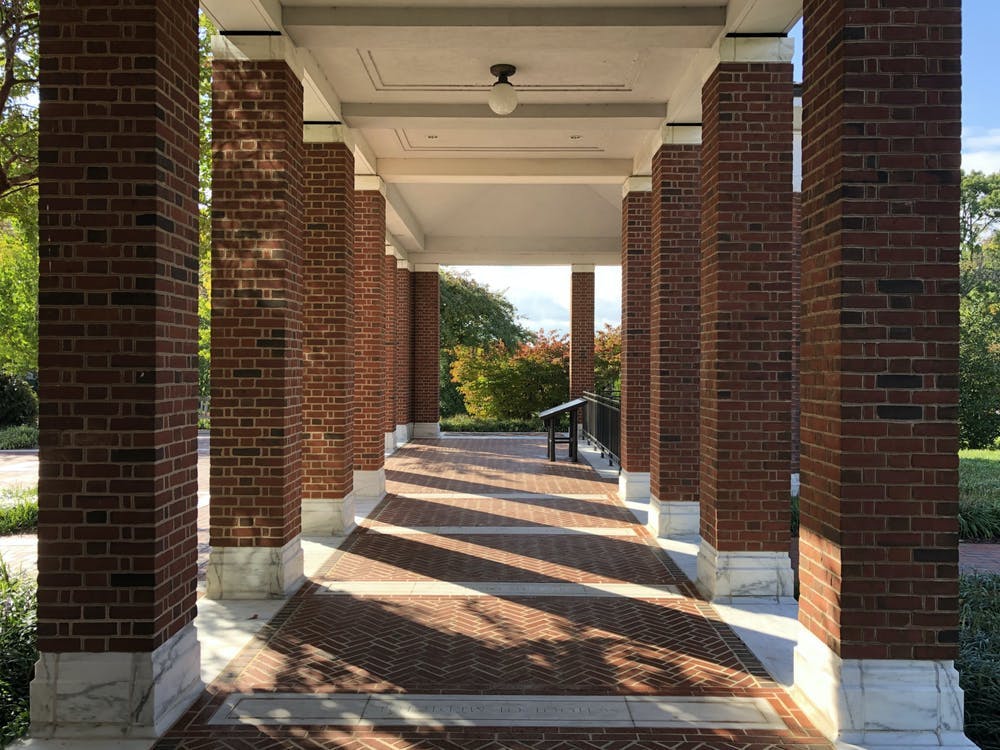Hopkins affiliates, including former students, held a protest on the Beach to call on the University to protect the rights of disabled students on May 4. Protesters described their experiences with discrimination and exclusion at Hopkins and outlined their demands for the administration.
The protest followed recent issues with the University’s treatment of disabled students, including the dismissal of five disabled students from the Clinical Mental Health Counseling program at the School of Education.
Alice, a protest organizer using a pseudonym, shared some of these demands in an interview. The News-Letter granted her anonymity due to privacy concerns.
“One of the demands that stand out is the re-admitting of the five dismissed disabled students from the Counseling program, and if they don’t want to come back, then refunding their tuition,” she said. “Also creating a separate disability office, separate from the OIE [Office of Institutional Equity] and from SDS [Student Disability Services].”
Alice explained that a separate disability office would be better at investigating issues involving disabled students on campus, noting that OIE has struggled to effectively advocate for disabled students in the past.
Katie Anderson, another organizer of the protest, added that another one of the main demands is improving the University’s process of granting accommodations to disabled students.
Following speeches presented by some of the dismissed students, protesters handed out masks with the phrase “ableism grows in the dark”. They then marched to Garland Hall to present their demands to administrators. Protestors were met with Vice Provost for Student Affairs Rachelle Hernandez, who listened to their concerns.
Protestors hoped to present their demands to Provost Sunil Kumar, but he was unable to speak with them that day.
In an email to The News-Letter, Vice President for Communications Andrew Green described the University’s plan to respond to student demands.
“In support of this commitment and as requested by the group, the Provost and the university are working to complete a careful review of the list of demands. The Provost will provide a written response to these important issues and opportunities for enhancement within the next week,“ he wrote.
According to Green, Kumar and Katrina Caldwell, Vice Provost for Diversity and Inclusion, met with the organizers of the protest on May 3 to hear their experiences and demands.
Anderson, who was one of the students dismissed from the Clinical Mental Health Counseling program, described how her experiences with OIE revealed the University’s lack of advocacy for disabled students.
“Ultimately, the school would side with the professors involved, and that’s a big part of what we’re demanding,“ she said. “Hopkins should revamp its processes for its complaints with how disability accommodations are handled. I’ve heard from so many students who are afraid to speak up, and I can't fault them for that because that fear of retaliation is real.”
In an interview with The News-Letter, senior Caroline Cerilli, who attended the protest, discussed the importance of creating a disability cultural center, which was one of the protesters’ demands.
“[SDS] sort of has the intent of letting you blend in and exist within nondisabled spaces,” she said. “The other side of that is through inclusion, which makes sure that disability is not something that is erased from a classroom and making sure that disability culture and community can exist on campus.”
Alice emphasized that she finds it unfortunate that students must shoulder the burden of bringing change for disabled students.
“We have to be the ones that show the spine because the faculty have less spine than piles of goo,“ she said. “Is that fair? No, that's not fair, but we’re doing it, because we believe in it. It’s a worthy cause, and it’s necessary.”
While the protesters were not able to present their demands to the Provost that day, Cerilli highlighted that the event brought students together.
“I spent four years trying to get a sense of the disability community at Hopkins, and it’s just been this painstaking process of finding one person at a time,” she said. “This was really nice just to see a lot of people at once who are all invested in disability equity at this institution.”
Cerilli also discussed her personal project, titled Digital Location Maps. The project aims to compile hand-drawn maps created by students that highlight places on campus that inaccessible to students with disabilities, such as pathways and buildings too far to walk to on high-pain days.
She hopes that the project can create a more interactive way to shine light on disability life on campus.
“[The University’s disability community has] a lack of attention, and I think a lot of shame is put towards it,” she said.“It would be really cool to make it visible and make a record of it in a place where it's not really supposed to be made a record of.”
Corrections: The original article did not clarify that the organizers of the protest met with Kumar on May 3.
Another quote has also been removed because the information was found to be inaccurate and misrepresentative of the student’s claims.
The News-Letter regrets these errors.





